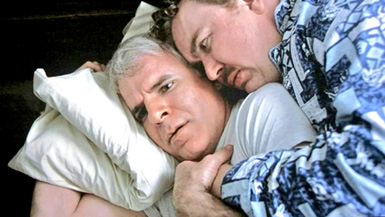Viking Night: Planes, Trains and Automobiles
By Bruce Hall
November 22, 2015
Neal and Del are on the same flight, which ends up being a good thing. Due to inclement weather, their plane is diverted to Wichita, KS. Neal is used to traveling first class and having someone else deal with his travel plans. He finds himself logistically unprepared until Del - expert merchant that he is - proves adept at social improvisation. In a situation where normal rules of engagement do not apply, Del is able to get things done where all the money and Madison Avenue bluster on earth are useless. For this reason, Neal agrees that they should share a hotel room.
Unfortunately there is one bed. And despite his friendly and generous nature, Del’s shabby appearance is more than just skin deep. He’s not just excessively talkative, casually irresponsible and mildly offensive in general - his personal habits are consistent with those of a developmentally disabled toddler. And while Del does have a gift for finding value, he’s also good at getting Neal to pay come up with the money, which doesn’t really make it FEEL like a gift. Guys like Neal don’t speak Gypsy and they only relate to value in dollars and cents.
That’s why, about a quarter of the way into the story, Neal flips his lid and rips Del a new one - and it’s perhaps the defining scene of the film.
By now, Neal is missing Thanksgiving with his family, is out a significant amount of money, and has had to spend an entire day with a man who - despite being the nicest man alive - is more irritating than syphilis. So when Neal lets his frustration get the best of him, he unleashes to Del’s face what we’ve all been thinking but could only say to someone if we were an elitist, judgmental prick whose defenses have been compromised by the Worst Day Ever. Neal’s tirade begins in justifiable territory, but as the Rage Quit progresses, it gets brutal - and deeply personal.
It goes on long enough that you almost forget you’re watching a movie. You almost forget that you’re watching two brilliant comedic talents who can also genuinely act. A spectrum crosses Del’s face as Neal somewhat unknowingly goes off the rails. First he’s angry. Then he’s hurt. And then, he looks like a kid who just found out that not only is Santa not real, but is just a homeless drunk who used to have a wife and kids but lost them on account of every time he closes his eyes he’s back in Nam.
And yet, Del’s response to this, and Neal’s subsequent reaction, is such an emotionally resonant moment that it sets the dramatic tone for the entire story. I won’t spoil the details other than to point out the film’s underlying theme of accepting both what and WHOM you cannot change. And while this sets the dramatic tone the humor is, of course, propelled by Hughes’ human touch and the prodigious talent of its two stars. Neal is perhaps a bit too taken with himself, but he’s also a genuinely loving father who deeply misses his adoring wife, his perfect kids, and waking up with them in that same absurdly huge suburban Chicago home that’s in every John Hughes picture.
And while Del is kind of an annoying bag of snot, the things inside of him - the things that make him human - are not different from anyone else. And of course in the spirit of the Holidays, we find that the package we present often influences how others perceive us - whether it’s justified or not. Maybe that’s why we have entire holidays devoted to the concept. No normal human being can remain tolerant and accepting for 365 days straight, and I think we all know that. So it’s not a bad idea; a few weeks in November and December when we all agree not to be assholes, then we get drunk and ring in the New Year with a hateful hangover.
The system works. And Planes, Trains and Automobiles is an established part of that system. Enjoy it this Thanksgiving with someone you love, whether you’re warm and safe at home, or curled up on a beer soaked, vibrating bed in Wichita with a smelly fat man kissing your ear.
Happy Holidays, everyone!
Continued:
1
2
|
|
|
|




